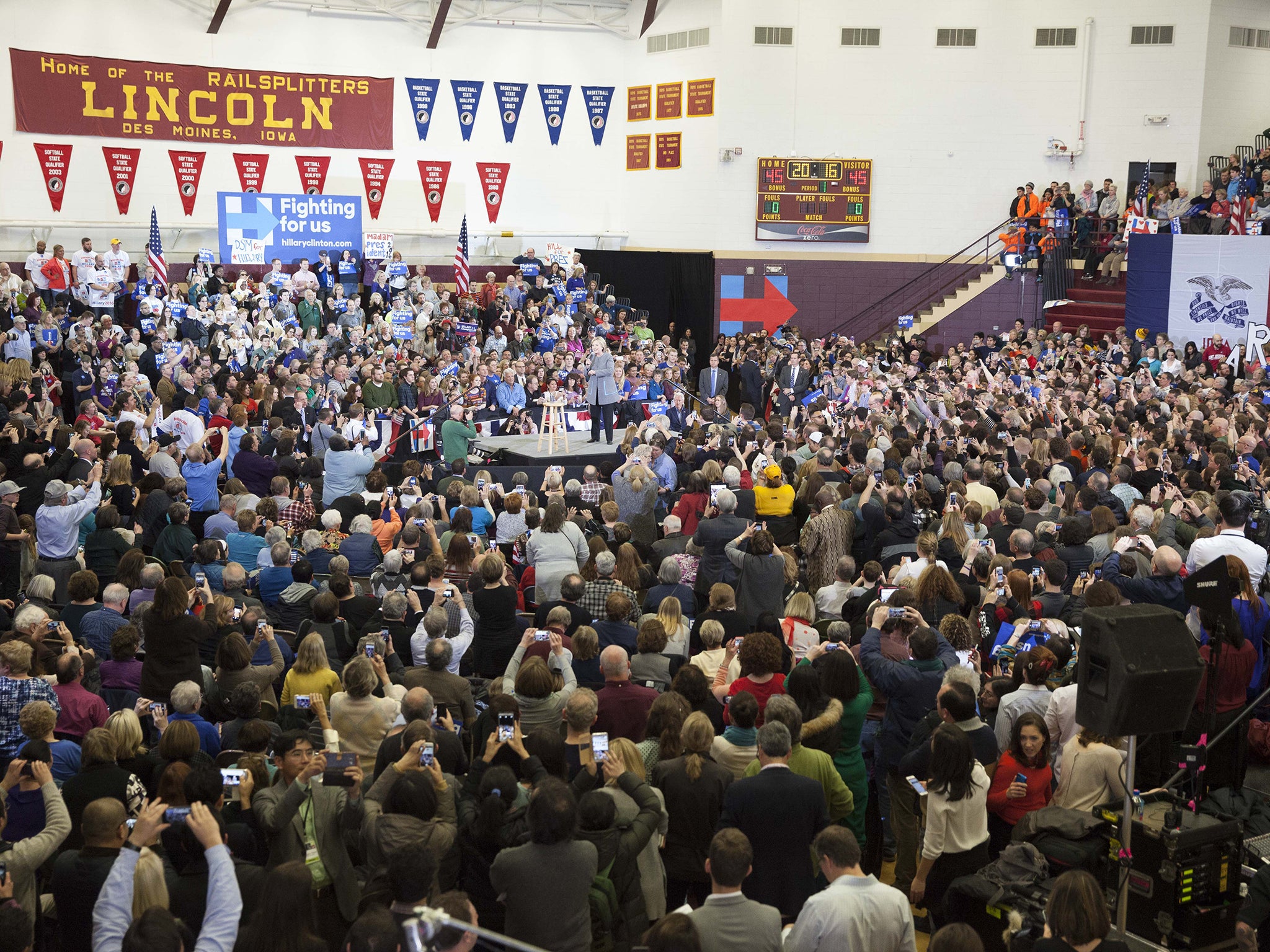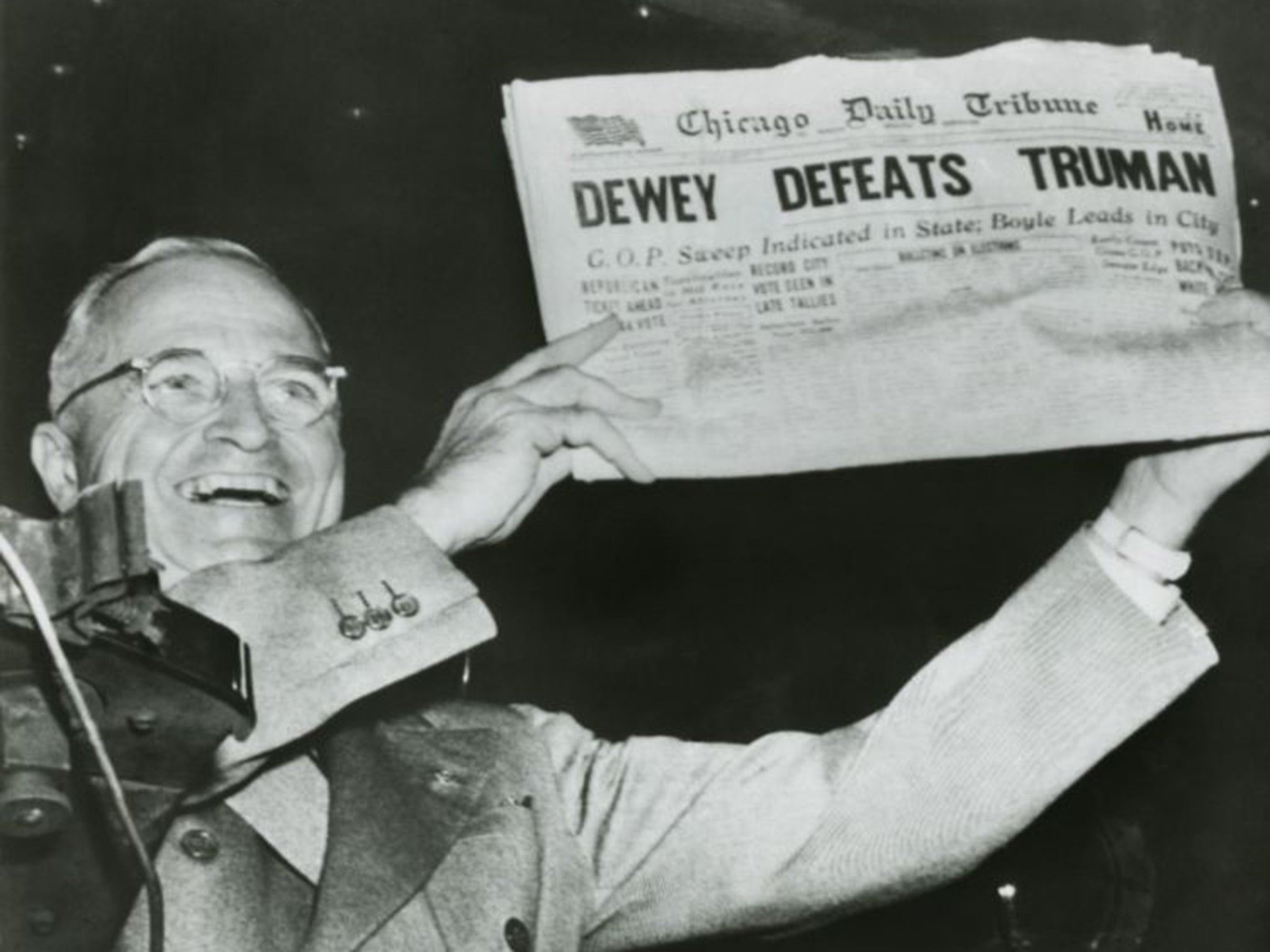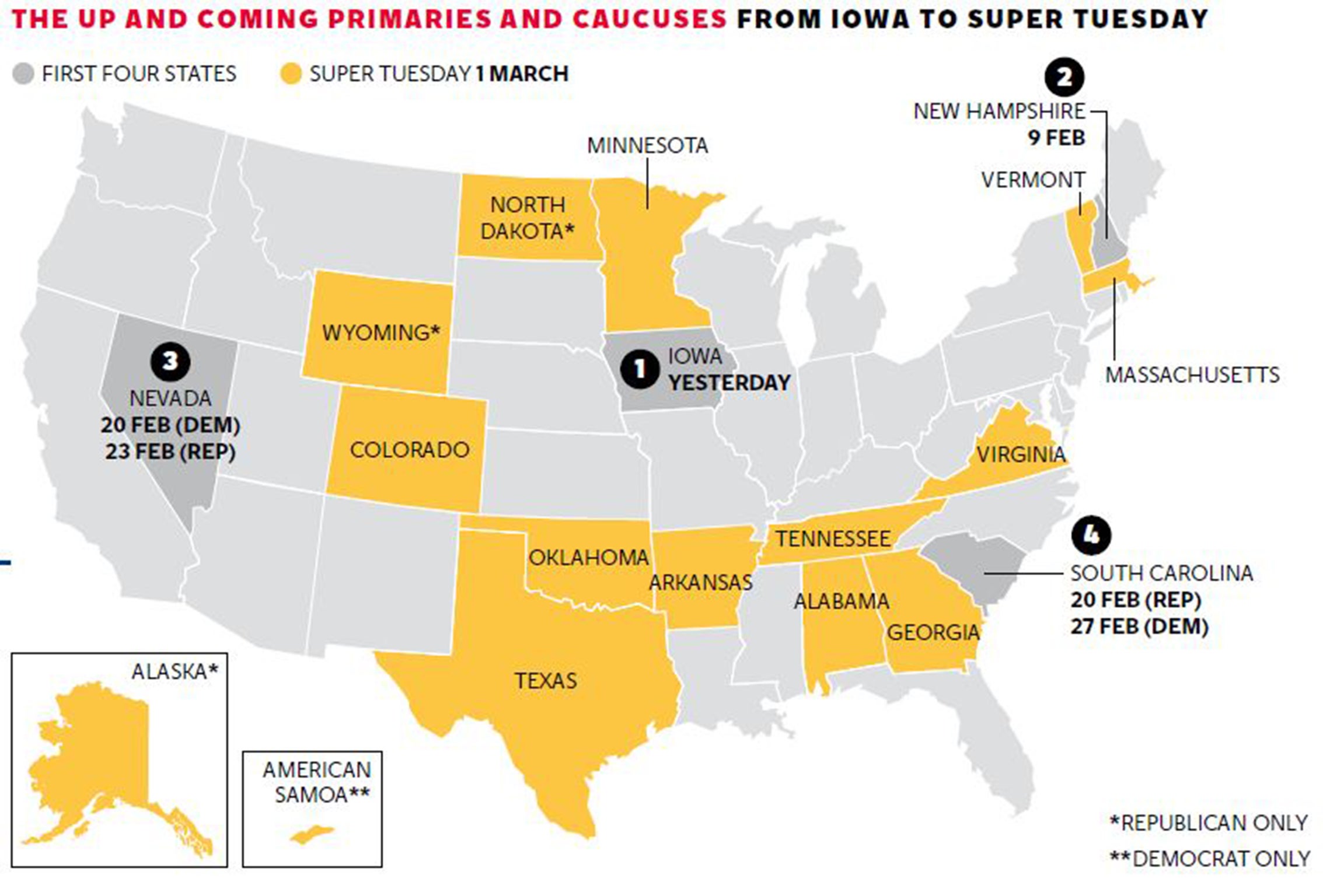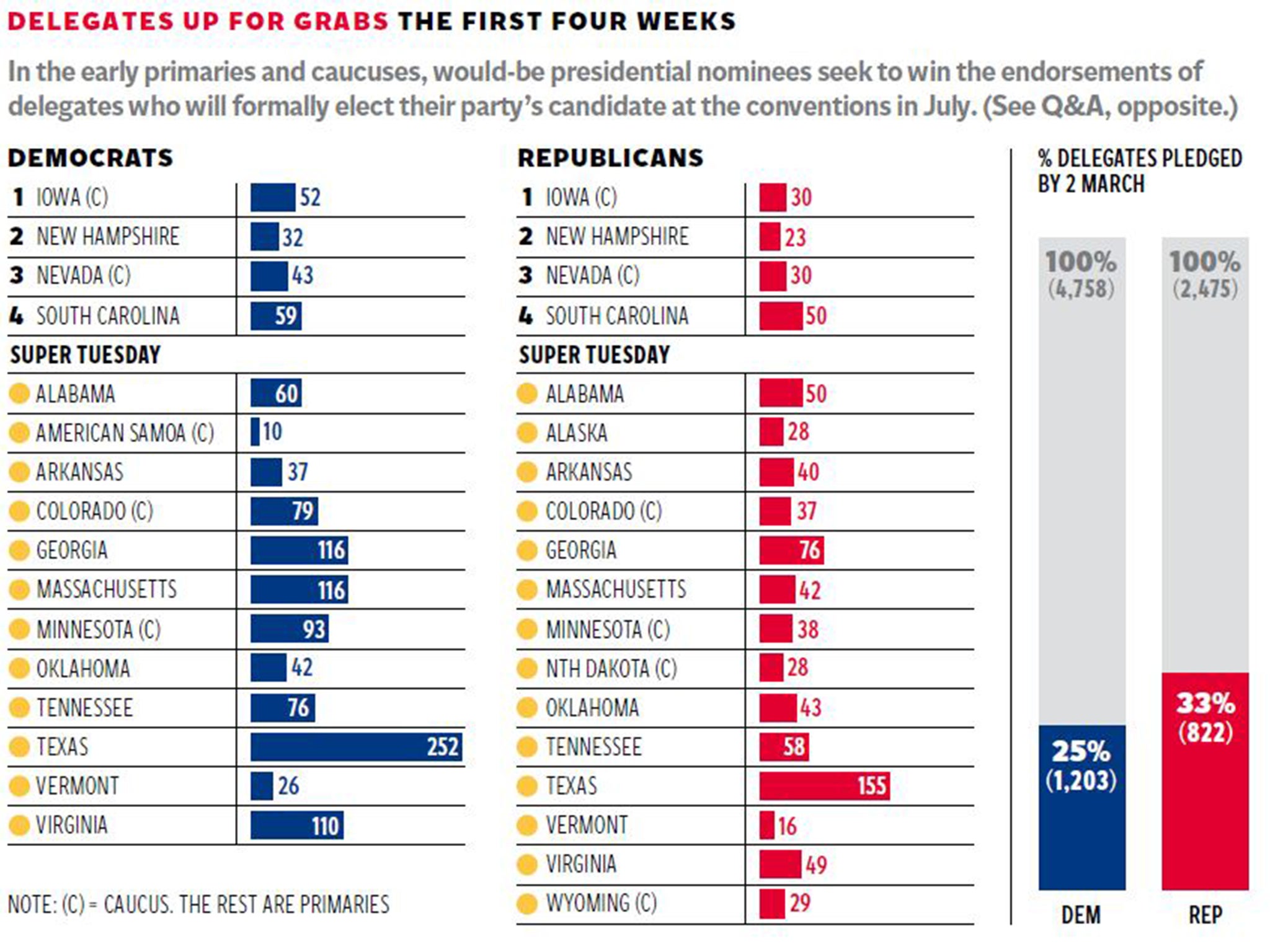The Iowa caucus is just the start of the greatest political spectacle on earth
From Truman proving the press wrong to the Supreme Court solemnly mulling Florida’s ‘hanging chads’, the US election has given us some compelling real-world drama. With a socialist insurgent on the left and The Donald on the right, this one looks set to follow suit

Your support helps us to tell the story
From reproductive rights to climate change to Big Tech, The Independent is on the ground when the story is developing. Whether it's investigating the financials of Elon Musk's pro-Trump PAC or producing our latest documentary, 'The A Word', which shines a light on the American women fighting for reproductive rights, we know how important it is to parse out the facts from the messaging.
At such a critical moment in US history, we need reporters on the ground. Your donation allows us to keep sending journalists to speak to both sides of the story.
The Independent is trusted by Americans across the entire political spectrum. And unlike many other quality news outlets, we choose not to lock Americans out of our reporting and analysis with paywalls. We believe quality journalism should be available to everyone, paid for by those who can afford it.
Your support makes all the difference.There’s no business like show business, and no election on earth like an American presidential election. None last as long, close on two years. None cost as much (upwards of $4bn, or £2.8bn, is the going estimate for the 2016 campaign). None can be as inspirational (Barack Obama, 2008), and none lend themselves as much to the media circus. And none are as capable of throwing up surprises – even before a single vote is cast in anger.
In terms of results, the biggest surprise, beyond doubt, was Harry Truman’s victory in 1948, immortalised by the photo of the re-elected President holding aloft the Chicago Daily Tribune with its headline proclaiming the victory of his Republican challenger Thomas Dewey. Those were the days before 24/7 polling. Such polls as there were all showed Dewey with a comfortable lead. But Truman’s barnstorming and relentless campaigning, combined with Dewey’s complacency, produced an upset for the ages.

Earlier stages of the process can produce equally seismic shocks – none greater than in New Hampshire in 1968. Until then it was assumed Lyndon Johnson would seek a second term. But the nation’s first primary, as so often, overturned every expectation.
Minnesota’s quixotic senator Eugene McCarthy, campaigning against the Vietnam War, came within seven points of victory over Johnson, at that stage only a write-in candidate. Quickly, Robert Kennedy announced that he too would seek the Democratic nomination, and on 31 March, 1968 LBJ declared he would not run for re-election. Thus was the stage set for the most tumultuous year in modern American history.
McCarthy of course was an upstart, who profited from the sheer length of the process. Obama was another. Few gave him much chance against the mighty Clinton machine when he declared his candidacy in February 2007. But a superbly run campaign whittled away Hillary Clinton’s massive early lead in the polls. Obama won the Iowa caucuses that kick off the primary season, and Clinton never again caught up.
The US electoral system, like Britain’s, is first-past-the-post, and thus makes life extremely difficult for insurgent third-party candidates, unless they have a solid regional basis, such as that enjoyed by the SNP in the UK.
But they can cause havoc nonetheless – never more so than in 1912, when former President Theodore Roosevelt ran against the incumbent William Howard Taft, splitting the Republican vote and handing Woodrow Wilson a sweeping electoral college victory, even though Wilson won only 42 per cent of the popular vote.


Something similar happened in 1992, when the billionaire Texan businessman Ross Perot led his new Reform Party against the incumbent George HW Bush and the Democratic candidate Bill Clinton. Soon after entering the race, Perot was leading in the polls. Then he withdrew, only to rejoin the contest after a perceived slight from Bush.
Despite his antics, Perot won 18 per cent of the vote, the strongest showing by a third-party candidate since 1912. Without a regional base, he did not carry a single state and thus won no electoral college votes. But he may well have taken enough support from Bush to hand victory to Clinton. But events in 1992 pale beside what happened eight years later. The 2000 election, featuring Democrat Al Gore, the incumbent Vice-President, and the elder Bush’s son George W, also had a third candidate, Ralph Nader of the Green party. The general election campaign itself was desperately tedious. Everyone expected the result to be close, but few seemed to care much who won. Except that on Tuesday, 7 November 2000, neither candidate won.
America has seen plenty of close elections: Kennedy/Nixon 1960, Nixon/Humphrey 1968, Carter/Ford 1976 for example. But nothing comes close to 2000, which hinged on the disputed outcome in Florida – although had Nader not secured 2.7 per cent of the national vote, Gore would probably have won the White House, irrespective of Florida.
In the event, a brutal battle between the Bush and Gore legal teams dragged on for five weeks. “Hanging chads” and “butterfly ballots” entered the language. Only when the conservative majority on the Supreme Court stopped a final statewide recount was Bush declared the winner, by a margin of 537 votes. But to this day, no one knows for sure who really won in Florida.
Finally, there can be fun before a single vote is cast. The Obama/Romney contest in 2012 ultimately proved pretty routine – but not before some pre-primary Republican front-runners like the pizza magnate Herman Cain left their bizarre, if ephemeral, mark on proceedings.
And so to 2016. Even if the actual primary voting throws up clear-cut winners, the pre-game show has been one for the ages. Hillary struggling against a self-proclaimed socialist; the saintly Ben Carson, a neurosurgeon by former trade; and of course the preposterous Donald Trump, defying every conventional law of politics. Only in America.
Follow this link for the latest coverage of the Iowa caucus: http://www.independent.co.uk/topic/iowa-caucus
Join our commenting forum
Join thought-provoking conversations, follow other Independent readers and see their replies
Comments